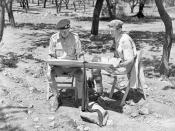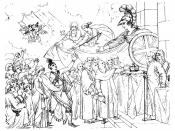"While the Women Only Wept: Loyalist Refugee Women", by Janice Potter-MacKinnon, is an informative look at the Loyalist women of the 18th and early 19th centenaries. The book includes the rare recollections of the day through the voice and thought of women. It presents the unique experience of women for the reader to gain a better perspective of what was otherwise a dominantly patriarchal recollection of history in this time. She begins with the Loyalist women of Eastern Ontario, then moves on to their involvement in the war. When husbands chose to be loyal to the British these women were the ones who were punished, facing harassment, pillaging and exile. For those women who escaped and survived they tackled a harsh reality of rebuilding their lives.
Much of the book, disappointingly, discusses events in which males were involved and spends a great time speaking about them. However, its foundation is essentially based on exploring the "officially" undocumented struggles of women with first-hand personal accounts through letters and diaries recovered from this period.
One of the more memorable and interesting stories was that of a revolutionary woman named Dothe Stone. She was born in 1756 in Litchfield, Connecticut (1 p. 5). The content of her diary, "which covers the years from 1777 to 1792" is explored (1 p. 5). In the mid-eighteenth century there was a social norm for a patriarchal type "hierarchy of power," (1 p. 7) where men acted as the decision-makers for all aspects of life while women and their dependants were the subordinates (1 p. 7). In Dothe's case her diary shows, like other women of her time, that she accepted that subordinate position. There is no evidence of complaining or expressing that her situation was unfair. Dothe accepted her role and duties in life. She...


